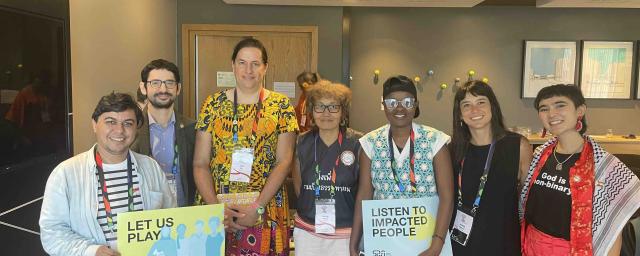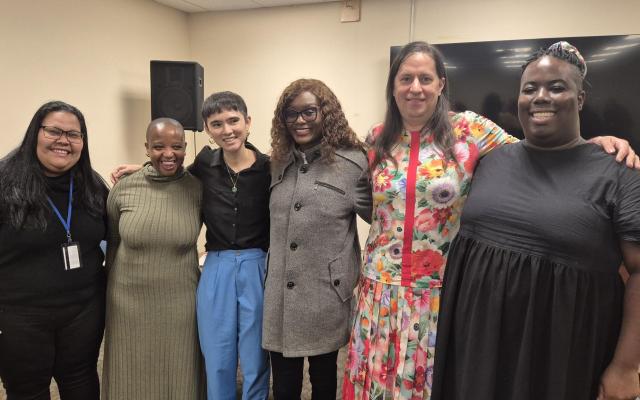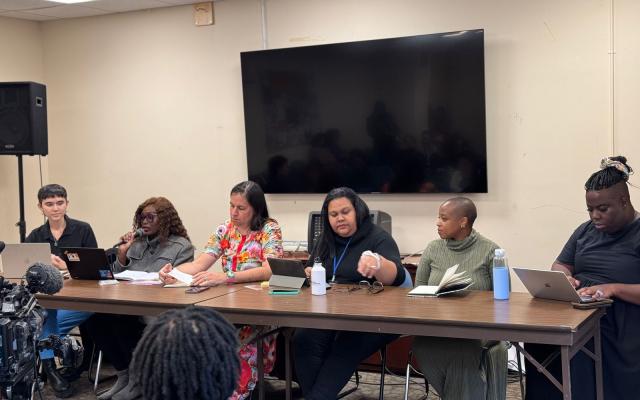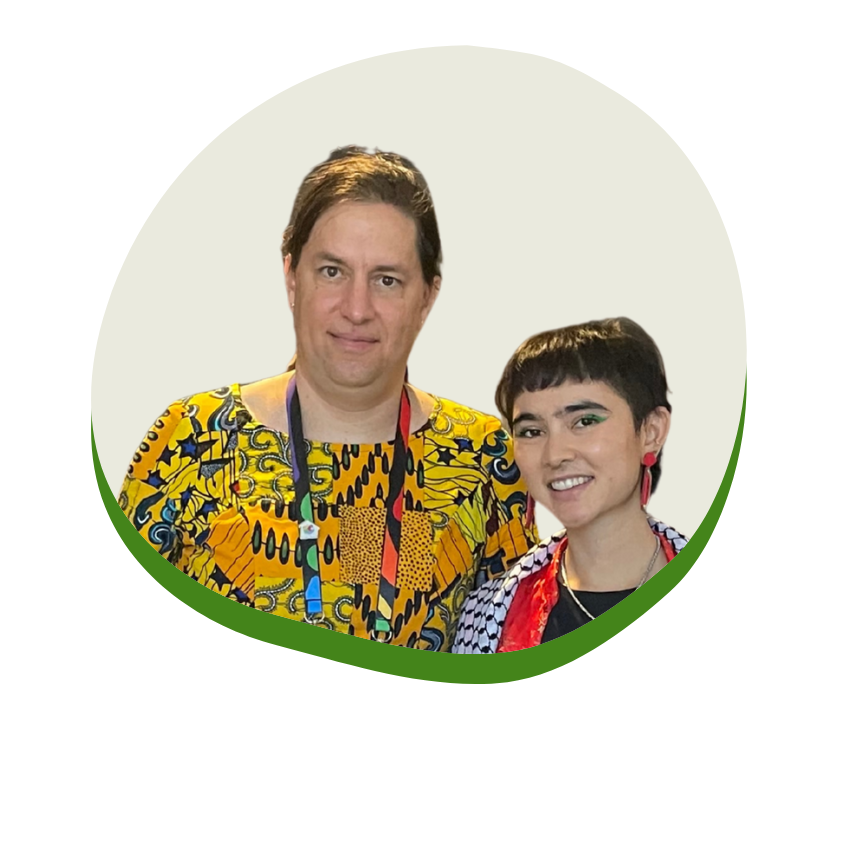
Photo courtesy of ILGA World
In this blog, Julia Ehrt and Lily Dong Li Rosengard of ILGA World reflect on the evolution of feminist and queer movements, the challenges of shrinking civic space, and the power of trust in building cross-movement solidarity. Through their candid exchange, they share lessons from history, confront internal fractures, and imagine more spacious, courageous, and restorative feminist futures.
Lily: Julia, I’d love to start by asking you how have feminist movements evolved since the first World Conference on Women in 1975 through to Beijing and today?
Julia: Feminist movements have gone through an immense transformation. Take the 1995 Beijing conference - there was the lesbian tent, which was radical at the time. But that visibility wasn’t reflected – not in the feminist movement, and in fact not in the LGBTI movement either. Our organization, ILGA World, is a good example of that. We had to go through multiple internal transformations – to embrace our movements’ diversity internally as well as in the work we do and in becoming a LGBTQIA+ organization that is not just an ally to feminist movements but striving to be a feminist actor ourselves.
If we want to be a legitimate voice pushing back against sex-based essentialist narratives that are on the rise, we must do that internal work within our own LGBTI movement and feminist movements more broadly as much as we do the external-facing work. That means acknowledging misogyny and transphobia in our history. For example, even with the Lesbian Tent in Beijing, the lesbians back then had a really hard time, and still do have a hard time when it comes to visibility, acceptance and being recognized as leaders in our own movement. Ignoring that would be erasing a critical part of the history of our movement.
Lily: That’s a critical reminder. You’ve also held many leadership roles. How have those experiences shaped your view of feminist solidarity?
Julia: Well, I’m the first woman and the first trans person to serve as Executive Director of ILGA World. But even though this suggests otherwise, in our past, when ILGA was a volunteer-run venture, women held key leadership roles. I think back to Lisa Powers, as she was one of the first to say “sexual orientation” in a multilateral space. Pioneers like her laid a foundation. At the same time, it is also true that the very early days of ILGA were quite male-dominated.
When it comes to my feminist journey, this dates back before I even came out as trans in the early 2000s. In the late 90s, I was exposed to a lot of feminist ideas. But in the early 2000s, at least in Germany, feminist spaces felt very closed off to trans people – not necessarily more closed off than to (cis-)men; however, post my coming out, that felt wrong. I was thrown out of some of these women’s spaces. So, trans activist-wise, I didn’t think feminist spaces were relevant to me back then. The LGBT movement also replicated a lot of societal exclusion, but I had always believed in the potential of collaboration and alignment as a trans movement with wider LGB(TI) movements and organizations. That belief wasn’t always shared in the trans or gay/lesbian movements. Many trans people rightly saw the LGB(T) space as exclusionary, and many gay and lesbian people thought it was better if we did our own thing. I suppose we, as a movement, got over that!
Lily: You mentioned the debates around trans inclusion within ILGA itself. Could you take me through a bit of that process?
Julia: Around 2006, I remember there was a significant debate at the ILGA World Conference in Geneva to change our name to include trans, bisexual and intersex people explicitly through changing the name of the organization: at the time was called “The International Lesbian and Gay Association”. Those were heated debates, and by 2008, the ILGA World Conference in Vienna decided to change that name. I mostly worked in Europe at the time, and that shift pushed ILGA-Europe to engage more seriously with trans movements. Today, this is almost a no-brainer – at the time, it wasn’t easy. By now we have gone way beyond that, and it’s amazing to see that a lot of these collaborations, which previously had not existed, now do, and how closely LGBTQIA+, feminist and SRHRJ movements work in collaboration. ILGA World has strong partnerships with AWID, IPPF, CREA, She Decides, the SRI and others - these didn’t exist 10 years ago, especially not on this scale.

Photo courtesy of ILGA World
Lily: Totally agree, for example, even just being part of this Oxfam blog series is a huge step forward in mainstreaming the perspectives of LGBTQIA+ movements with a large mainstream development organization.
You’ve worked at the intersections of many global movements. What are the strategies that have helped sustain feminist solidarity across such diverse movements?
Julia: Honestly, relationship-building. Collaboration requires trust, and that trust takes time. That trust is built often outside of formal spaces and not necessarily between organizations first, but between people. Side events are good and all that, but it's the dinner after the meeting, the drink at the bar, the trip to the theatre that builds those bonds. Without that, it’s hard to build the kind of trust that can hold across disagreement.
It’s also important that we are in spaces where we’re not expected. Some of the most successful gains our movements made were because someone was able to “sneak” into mainstream institutions and then become an anchor. I think you, Lily, have been a person like that as well: working as a queer person in a more mainstream organization, making queer issues visible within your institution. Of course, it should not be the burden of queer people to do that, but as a matter of fact, it often is.
Lily: There’s been a lot of backlashes recently, especially with the rise of conservative and anti-gender forces. How has this impacted your advocacy?
Julia: The backlash is hitting our movements hard, but there are also unexpected developments: the backlash has created opportunities as well. Many women’s organizations now seem to see more clearly how attacks on trans people are more broadly attacks on gender equality itself. So, there’s growing solidarity. At the same time, our world has become more polarizing. There's less room for learning, for failing, for being wrong and evolving – in particular the social justice movements. Oftentimes, it feels like if you’re not 100% aligned, you’re out. That’s dangerous and prevents wider collaboration.
It seems to me that we’ve mirrored this externally imposed shrinking of civic space in our movements. Our insistence on perfect alignment has shrunk our own political space in which we can maneuver. Our insistence on calling each other out has, in effect caused a shrinking of space, and we must recognize that it has power to withdraw collaboration, and we need to be critical of how we use that power, in how we choose to exercise it, or not.
Maybe this is controversial to say, but it seems we unintentionally shrink our own space. We have wider issues of freedom of association, expression, civic space, etc. – but there is an internal component we very often do not discuss, where we need to make a conscious and active effort in countering how we shrink our own space. And this adds to the effects of backlash, authoritarianism and fascisms that aim at shrinking civil society space as such.

Photo courtesy of ILGA World
Lily: It is sad because in our advocacy and external focus we end up by default almost replicating the same structures internally, which is essentially counter to the entire point, but it seems to be what humans excel in!
What do you think is needed to counter that shrinking space?
Julia: Sometimes people are clumsy and do not have the right language or knowledge to address trans people, for example – they come across as transphobic – might even be transphobic – often out of ignorance or not knowing. And of course, it should not be the burden of trans people to educate the world – in the same way that it must not be the task of people of color to educate the world about racism. At the same time, we need to be brave enough to let people learn. Right now, we don’t give people or organizations time or grace to go through that process of failing and learning, of making mistakes and not getting it right all the time and then correcting. And yes, processes like that can be excruciatingly slow and painful as they retraumatize us who have grown up with the experience of discrimination and exclusion. Unfortunately, I do not think anyone is coming to do that for us…
Working together if one is perfectly aligned is easy, but if we only talk to and work with people who already agree with us, we’re not actually moving anything forward. We need to be braver than that – but I admit that’s deeply difficult.
Lily: Yes, it’s like the phrase “hurt people, hurt people” because those of us with historically marginalized identities have been through trauma, which is exactly what thrust us into activism in the first place. Meanwhile those in the dominant majority often move their harmful ideas forward with gusto, without this deep internalized trauma holding them back given they’re used to having their voices and priorities heard and reflected in wider society.
What is your vision for the future of feminist engagement?
Julia: I’d love to see a more spacious movement. One that allows for mistakes, for growth, for nuance. A movement that leads with courage, not just correctness, a movement that is restorative, not punitive in approach. And one where we stop duplicating work - let’s write fewer reports and build more relationships. If we want to expand the space we operate in, we must do it together. That means trust. That means showing up for one another, even when it’s hard.
We need more informal spaces as well. Not everything can happen in a side event at the UN – an extremely restrictive and highly formalized space. Trust doesn’t build in panels. It builds when we allow ourselves to be human with each other.
Lily: Yes! I always say we need to spend less on conferences and more on healing our movements. We need something like a lab for healing - like couple’s therapy for organizations - to rebuild trust, understand past fractures, and find ways to move forward together. With time, intention, and shared goals, we can repair bonds and collaborate more effectively.
Julia: Yes – we need the conferences and the panels and the side events, at the same time, there is a need for informal space. Trust is elusive and difficult to build even amongst people who agree with a lot of common things within social movements, and sometimes I’m puzzled by just how difficult it is to just let go and have faith in others. For me, that’s what trust comes down to: it’s all about having faith that others, whom we have no control over, do the right thing eventually; that’s what trust is about.
Lily: Thank you, Julia. Your insights, honesty, and vision are incredibly powerful. It’s been wonderful to have this conversation with you today.
Julia: Thank you. It’s been a pleasure.
As Julia and Lily reflect, the future of feminist and LGBTQIA+ movements depends not just on shared goals, but on the care and courage we bring to the spaces we occupy - formal and informal alike. Building trust, embracing nuance, and allowing room for mistakes are not signs of weakness, but of resilience.
In a world where civic space is shrinking and backlash is relentless, our collective power grows when we show up for one another, listen across differences, and invest in relationships. Feminist solidarity, at its most transformative, is both restorative and forward-looking: it demands that we nurture our movements from within even as we challenge injustice beyond. The path ahead is neither linear nor easy, but with trust, intentional collaboration, and courage, a more spacious, inclusive, and thriving feminist future is not just possible, it is waiting to be built.

Julia Ehrt (she/her) is the Executive Director of ILGA World, and Lily Dong Li Rosengard (they/them) is the Senior Specialist on Gender Identity, Gender Expression and Sex Characteristics at ILGA World.